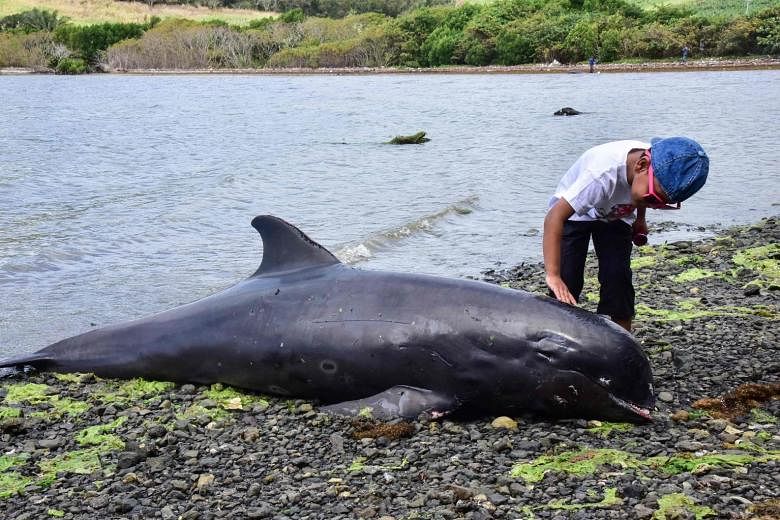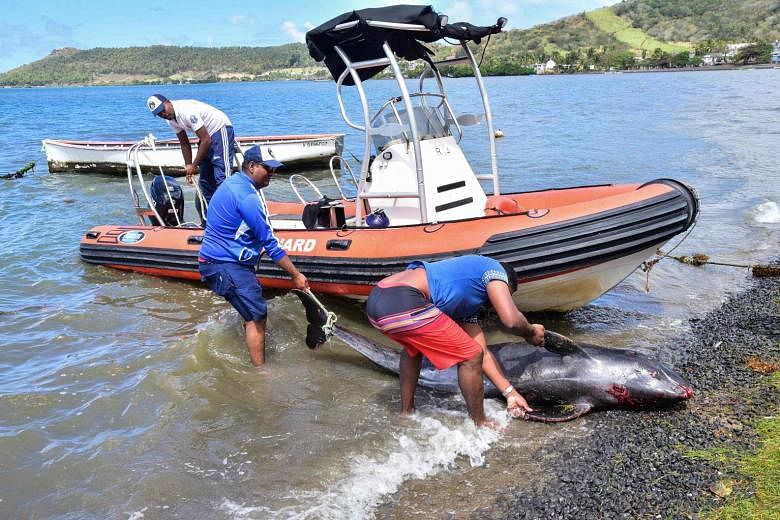ADDIS ABABA, PORT LOUIS (REUTERS, AFP) - Seventeen dead dolphins washed up on Mauritius' shore on Wednesday (Aug 26), a government official told Reuters, a month after an oil spill from a Japanese ship that ran aground caused a major ecological disaster in the area.
Meanwhile, at least nine melon-headed whales washed up on beaches, according to an AFP journalist on the island.
"The dead dolphins had several wounds and blood around their jaws, no trace of oil however. The ones that survived, around 10, seemed very fatigued and could barely swim," said Jasvin Sok Appadu from the fisheries ministry.
The dead dolphins have been taken to the Albion Fisheries Research Centre for an autopsy, Appadu said.
Results are expected on Wednesday night.
A spokeswoman for local Mauritian environmental group Eco-Sud called for the autopsy results to be released publicly and said the group wanted to be present during the autopsy "to better understand why the dolphins died," but was still waiting for a response from authorities.
The whales, some of which were still alive when they were found and later died, were stranded on the south-eastern beaches of Grand Sable, and some of them appeared to have injuries, said AFP.
Local government official Preetam Daumoo said he had seen 13 dead whales and one still alive.
Authorities loaded some of the bodies into the back of a van to be taken for autopsies.
Daumoo, like other residents, said he feared the stranding was a result of an oil spill earlier this month, after a Japanese-owned bulk carrier - the MV Wakashio - ran aground on a coral reef around 10km from Grand Sable, spilling over 1,000 tonnes of fuel into the pristine waters.
The broken stem of the vessel was sunk in the open ocean on Monday.
However, experts said it was too soon to say what had caused the deaths of the whales.
Owen Griffiths of the Mauritius Marine Conservation Society told AFP "it is probably a very unfortunate coincidence", referring to a similar stranding in 2005.
"Likely they followed a school of fish into the lagoon, got confused, could not find their way out to sea again and tried to head out to sea directly over the coral reef instead of finding the pass. In their panic and stress they collided with corals, became exhausted and died," he said.
"At this stage, we have no idea of cause of death. An autopsy with stomach content analysis and lung examination - to look for oil traces - needs to be done."
'STRESS TO THE CORALS'
Greenpeace called in a statement for an "urgent investigation" into the cause of the strandings.
Authorities and experts from Japan and Britain are still investigating the true extent of the ecological damage to an island whose economy depends heavily on tourism.
The wildlife at risk includes the critically endangered Pink Pigeon, endemic to the island, seagrasses, clownfish and mangrove forests, whose roots serve as nurseries for fish.
The remaining wreck is still grinding against the reef where it ran aground.
"If this situation continues, it could cause stress to the corals and could kill them," said Noriaki Sakaguchi, an ecosystems expert with Japan International Cooperation Agency.
The team of Japanese experts said on Tuesday that the spilled oil has also reached the soft soil of mangrove forests along the coastline. While there is no evidence of mangrove death yet, the oil could kill plants in the protected area in coming months, the team warned.
The Mauritius Marine Conservation Society says 15km of coastline has been affected by the spill and it is moving towards the Blue Bay Marine park, home to 38 types of coral and 78 species of fish.


